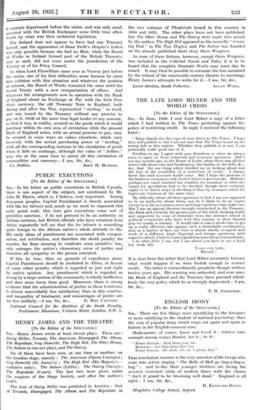PUBLIC EXECUTIONS
[To the Editor of the SPECTATOR.] SIR,—In his letter on public executions in British Uganda, there is one aspect of the subject, not mentioned by Mr. John H. Harris, which is, I believe, very important. Among European peoples, Capital Punishment is closely associated with the lex talionis and, much as we need to supersede this early penal code, this does give executions some sort of primitive sanction. I do not pretend to be an authority on African customs, but British officials who have returned from Africa repeatedly tell me that the lex talionis is something quite foreign to the African native's whole attitude to life. His early ideas of punishment are associated with compen- sation, not retribution, and therefore the death penalty for murder, far from seeming to vindicate some primitive law, only outrages the native's elementary sense of justice and transfers all sympathy to the person executed.
If this be true, then on grounds of expediency alone, Capital Punishment should be abolished in Africa, in favour of some other penalty which is regarded as just and right by native opinion. Any punishment which is regarded as wrong by a large section of the community is wholly ineffective and does more harm than good. Moreover, there is strong evidence that the administration of justice in these territories is almost unavoidably less satisfactory than in this country, and inequality of treatment, and miscarriages of justice are far less unlikely.—I am, Sir, &c., E. ROY CALVERT. National Council for the Abolition of the Death Penalty, Parliament Mansions, Victoria Street, London, S.W . 1.






























 Previous page
Previous page